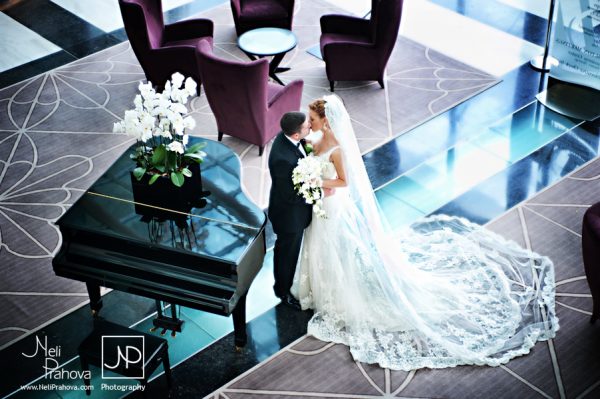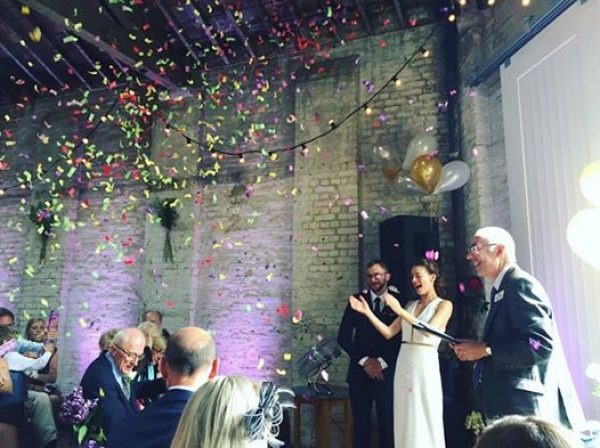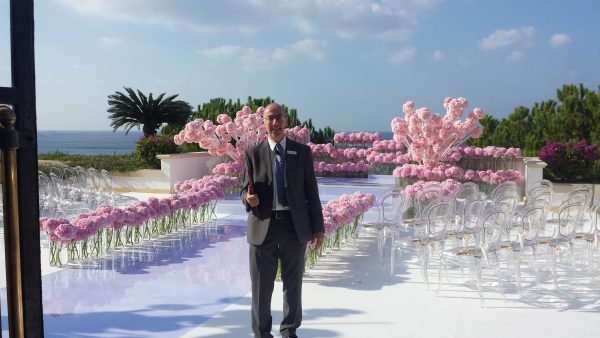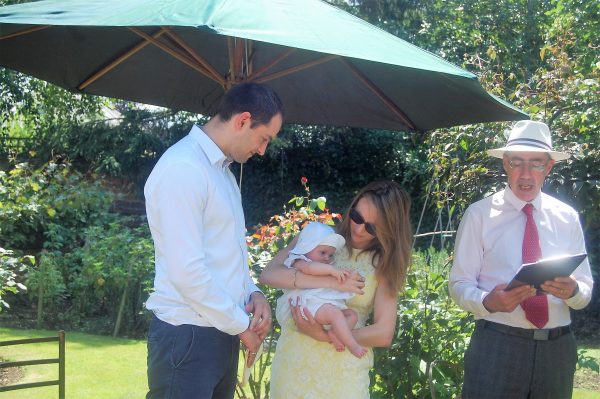
by Michael | Apr 11, 2018 | Blog
Don’t believe anyone who claims that wedding music does not play an essential part in the proceedings.
Whatever the tone of the ceremony (formal, semi-formal or informal, traditional or modern), music can make a huge difference to the character and atmosphere.
The final choice of music has to be down to the couple themselves. However, as celebrant, I am occasionally called upon to give advice or guidance. The following are my own thoughts, but, of course, are only general in nature.
Music – when?
The ‘normal’ places for music are during the Processional (as the bride comes in) and the Recessional (when the couple walk out at the end). If you’re having a signing of the Register, that can also be a good time for music.
However, you can air a piece of music as part of the ceremony. Perhaps you have a trained opera singer as an aunt, or know a child-prodigy violinist. Or you may want to play some recorded music that means a lot to you both.
You may opt for music either side of the vows, although that is less common.
There could certainly be music while guests are waiting before the ceremony. Your choices will set the tone for what follows, so think about this too.
But beware of too much music – the ceremony (however beautiful) shouldn’t go on for ever.
Music – which?
Wedding marches are commonly played at the Processional and Recessional. But there’s no obligation to use these.
The music does not have to be classical, of course. It can be any genre, depending on the wishes of the couple. Indeed, there may be good reasons to choose music from other cultures, and this can be fascinating as well as moving for guests.
For a religious ceremony, you will probably want a hymn or two.
Baroque or Classical composers’ music (eg Bach, Handel, Beethoven) is often played during the signing of the Register. Make sure these pieces are long enough.
Music – how?
Live music can make a ceremony very special indeed. It can be quite costly, of course, but, as long as musician(s) and celebrant agree beforehand when the music is going to be played, this can be a lovely touch.
A PA system comes cheaper, naturally, but a lot of reliance will then need to be placed on both the audio equipment and the operator.
To ensure smooth running of the ceremony, a rehearsal (with musicians/audio equipment) can be recommended, although responsibility for paying for this would be the couple’s.
Music – why?
Music heightens the emotions and gives meaning to the moment. It will help bring about a wonderful feel-good sensation and contribute to ensuring that the ceremony will be memorable for all the guests and a highlight of the couple’s life together.

by Michael | Apr 11, 2018 | Blog
For (nearly) 250 years the US has existed independently of the United Kingdom. That time has witnessed many changes. Language is one example (“faucet” for “tap”, “diaper” for “nappy”, “sidewalk” for “pavement” – you name it, the list seems endless).
Bridal traditions have also changed.
Language
In some cases with these traditions, it’s only a matter of language too. So the “bachelorette party” is better known in the UK as “hen party” and the “bachelor party” as “stag do”. Furthermore, the “Maid of Honour” is often referred to as “Chief Bridesmaid” over here, and “Groomsmen” as “Ushers”. As a “Civil Celebrant” myself, I have had to become aware of the American version of my job-title, which is “Officiant”.
Conventions
Other (non-verbal) traditions include no bridal showers in the UK (although they are beginning to catch on, I think).
Invitations can be different. In the UK there may be two types: one, attend everything; the other, just come for the reception. In the US, the invitation will include ceremony and reception.
The Ceremony
One significant difference is the processional. At the start, in the UK the bride walks down the aisle followed by her bridesmaids; in the US the bridesmaids precede the bride.
There also tend to be more bridesmaids in the US (on average 5) compared to those in the UK (3).
For the processional, US bridesmaids and groomsmen pair off and enter together; in the UK the ushers are often waiting with the groom.
Often in the UK (but almost never in my ceremonies!) the groom faces the celebrant with his back to the guests; in the US he will face the guests as the bride comes down the aisle.
Another difference at the ceremony is the wedding party. In the US, they stand with the bride and groom during the ceremony, whereas in the UK they sit with the guests.
Post-ceremony
After the ceremony, there is likely to be a bouquet or garter toss in the US, but not over here. Only in the US can you expect a dance for the parents (formally announced).
Finally, the Americans will include toasts by the bride’s father, maid of honour and Best Man, whereas over here there are normally major speeches by the father of the bride, the groom and the Best Man (and, nowadays, sometimes, by the bride).
Although we have so much still in common with our American “cousins”, a lot, as we can see when we look at the bridal traditions, is different too.
Variety is, as they say, the spice of life.

by Michael | Mar 19, 2018 | Blog
A foreign wedding can be exciting and so different! Your surroundings are likely to be beautiful and even exotic. You can probably look forward to better weather than the UK will provide. The atmosphere will be a holiday one, and that can add to the occasion. People will have a chance to get together before the wedding in a relaxed way, and get to know each other.
What’s not to like?!
A foreign wedding may make one set of family and friends very happy. It means that your honeymoon starts even before the wedding!
On the debit side, cost, travel and accommodation arrangements for yourself are likely to be an issue. Even more so if you are looking after your guests’ arrangements.
And which guests do you invite, anyway?
Language may be an element that works against you, especially if the wedding co-ordinator does not speak good English. Making arrangements at a distance can be difficult anyway.
Who are you paying for? Is it just yourselves? Perhaps it’s you and your close families? Maybe you’re paying for your guests’ accommodation? And meals?
Are you going to arrange a subsequent ceremony, like a wedding blessing, for those left behind in this country?
There’s a lot to consider, so planning a foreign wedding is not a step to be taken lightly, appealing as it may well be.
Travel
You’ll have to decide how long before the wedding you arrive at your destination. Allow time to recover from the journey, and long enough to sort things out with the wedding co-ordinator (if you have one). You may also want to arrange a rehearsal.
Hotel
You need to make contact with the co-ordinator at an early date. Have a look at the ceremony space, and then the reception area. Do (or will) they have everything you need and asked for? Can you arrange a rehearsal (if required)?
Check that all suppliers are confirmed (celebrant, catering, photographer, make-up, florist etc.).
You may be in charge of your guests’ arrangements. How will they get from the airport or station to the hotel? Are the rooms booked? And meals?
Every wedding will be different. Nonetheless, I hope this will be useful as a starting-point before you decide whether a foreign wedding really is for you.

by Michael | Mar 8, 2018 | Blog
Where do you begin, when planning your wedding?
If nothing else, consider these points:
- The budget
Obviously, this is the bottom line. You need to work together with anyone who is helping you here (probably your family?), and decide rationally what you will spend. It’s no good getting carried away with enthusiasm – you need self-discipline.
Big as the occasion may be, you do not want to bankrupt yourselves. And it’s worth pointing out that the amount spent does not guarantee the success of the marriage itself!
The event is (or should be) a ceremony; it should not be an attempt to show off how rich or extravagant you are. Should the reception mean more than the vows?
Good taste and sincerity are more important.
This doesn’t mean that you can’t have a few OTT touches (budget permitting), but these should be a bonus rather than what you are aiming at. There are probably certain elements that you will insist on, and it’s as well to discuss these at the outset, so that they aren’t overlooked later.
The budget will also dictate the ceremony, participants, reception and number of guests to invite, but that is something I cover elsewhere, notably in my book “Your Wedding Guide”.
- Date & location
Naturally, it will be more expensive to schedule your wedding at peak times (such as summer holidays, Christmas or around Valentine’s Day). You may want to avoid major events, such as World Cups and holiday season, when your potential guests may be otherwise engaged.
You’ll need to consider climate too, if you want an outdoor wedding. Or, at least, a Plan B.
The venue should, of course, be where you want it to be, but if it’s in an exotic location, your guests may have to go to a lot of expense and trouble to attend, so keep that in mind.
Make sure you visit the venue, ask questions and ensure that you really want to have your ceremony there.
- Other Suppliers
As soon as you have settled on your budget, start choosing other suppliers that you may need. Like the venue, which may want a year or more advance warning, you should allow plenty of time, in order to secure the supplier of your choice.
Among others, you will need to consider florists, caterers, musicians and, not least, celebrant. Where possible, you should meet with these first, so you can feel confident you have made the right choices. All that takes time, so allow for that.
- Choosing theme and colours
It’s easy to get excited and let your imagination run away with your wallet. Keep your budget in mind, use wedding books and planning guides and whatever resources are available to you.
Do not over-decorate. Make full use of flowers and candles.
Be creative with the colours. These may reflect the bride’s personality. Vivid colours (tastefully combined) can be most effective.
- Vows and music
The vows are one of the most important elements of a marriage. They should be well-planned – and audible. They are a public declaration of your mutual feelings, and should not be under-valued.
Equally, the music should be planned carefully and be clearly audible. Make sure you choose lyrics that you want your guests to hear!
Hopefully, the planning will be a team effort (maybe even the groom will be willing to participate!). If approached in the right way, it can be enjoyable and exciting, and the result will be so worthwhile.
For further advice, please contact Michael.

by Michael | Jan 30, 2018 | Blog
There are no guarantees about the weather anywhere. Living on an island like Britain, we are not particularly surprised by heat in winter, or rains and snow in summer. So who would dare arrange an outdoor ceremony?
A wonderful setting for a handfasting!Almost exactly four years ago, I was privileged to conduct a handfasting on an Iron Age fort that – as the picture above shows – was totally exposed. It was a period of exceptional floods across Britain. I drove down through torrential rain, and had to drive back through a thunderstorm. Amazingly, for the couple of hours I was up on Old Sarum (I had to be there early to set up), it didn’t rain and wasn’t even (very) cold.
I’ve officiated at a small number of outdoor ceremonies in the summer when the conditions were, shall we say, difficult. In one case, there was a sudden cloudburst during the wedding. Somebody had the presence of mind to bring a parasol from the hotel terrace to protect the bride (though not the celebrant!). On another occasion, a vow renewal, there was a yurt available, but the rains held off sufficiently, and we could stick to Plan A. On a third occasion, the day was cloudless and extremely hot for the naming ceremony. Fortunately, this was a garden event, and there were plenty of trees offering shade.
Sun
So what can you do, if the forecast is hot and sunny?
You can usually rely on some common sense on the part of your guests. They may bring a hat and maybe sunscreen etc.
You can make sure that plenty of cold drinks (preferably, not alcoholic at this stage) are available. Depending on the sort and size of ceremony and the venue, you may be able to offer parasols or small umbrellas for the guests. If shade is available, then make use of it. Finally, bring the guests out as late as possible, and keep the ceremony short, if that is feasible.
Wind
There’s not much you can do about wind, especially if your ceremony will be held at an exposed spot. One thing to be aware of is that wind will take sound away, so the celebrant’s voice, at least, will probably need to be amplified. Hats and veils will need attention, if they are not to be blown away.
Rain
When the rains are expected, you may be able to issue umbrellas to the guests. If there are seats, try and keep them covered with plastic, say, until the last moment.
If it’s muddy, perhaps the venue can put down some sort of (red?) carpet, so that heels don’t get submerged and trousers splashed.
Cold
Hopefully, guests will have the sense to arrive well-protected. It may be possible to issue blankets. If the length of the ceremony can be kept to a minimum, it might be appreciated by your guests.
Reality
Despite all this pessimism, of course, the chances are that the weather will be wonderful for your big day! And there’s nothing like having your ceremony outdoors – it really makes it special (just occasionally, for the wrong reasons, though!).
If your ceremony is in the grounds of the hotel, it’s worth chatting to them in advance, especially if adverse weather is anticipated. They may have a Plan B for you.
An outdoor ceremony? A gamble, yes – but one well worth taking.




